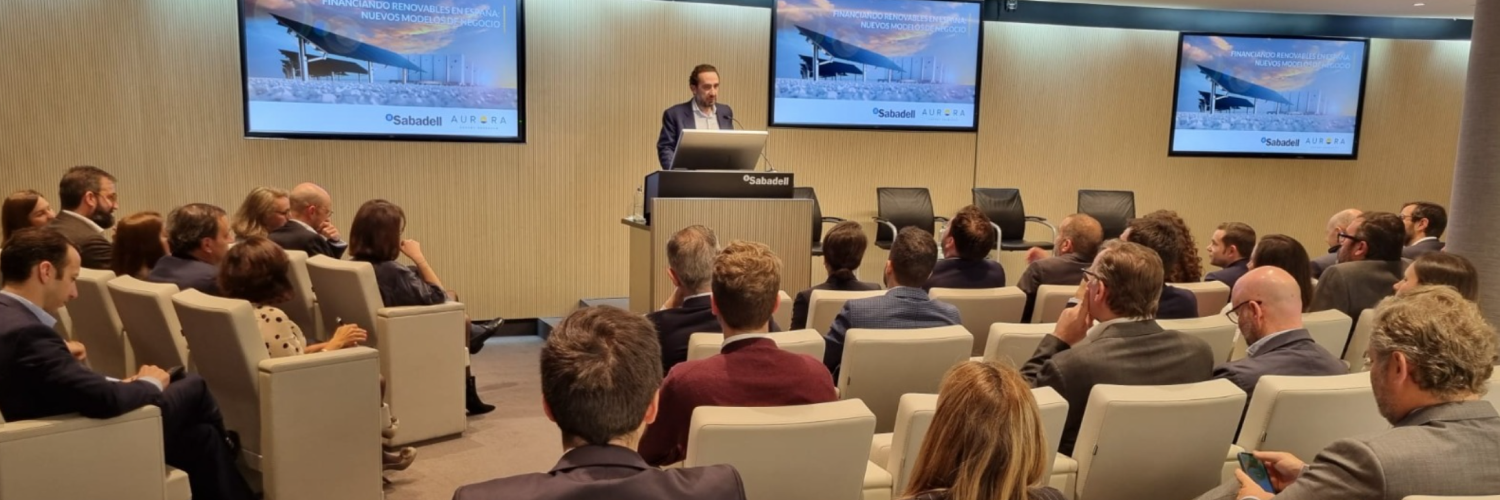Under the title ‘Financing renewables in Spain: new business models’, the conference took place in Madrid on 22 February. The conference was organised jointly by Banco Sabadell and Aurora; through roundtables and talks it examined in depth the principal challenges to be met over the next few years in the process of decarbonising the economy and the widespread adoption of renewable energy.

In his opening talk, Joaquin Lopez, head of Structured Finance at Banco Sabadell, highlighted the Bank’s role as a leader in the field. Banco Sabadell made its first investment in renewable energy in 1992. Following early transactions in Spain it leapt to the United States, where it carried out a large number of transactions, and to countries in Latin America (most particularly Mexico) and Europe.
He described the Bank’s line of approach as “a very long success story, of which we are very proud, especially in times like these when it has been become clear that we will have to provide every stronger support to this type of project. By 2030, and depending on which sources you consult, there will have to be an investment of 230 million euros in renewable energy. A very significant challenge.”
“It's not just about installing megawatts. The system has to be changed.”
“If we really want to reduce as far as possible our use of fossil fuels, as well as installing megawatts we need infrastructure, we need demand and we need to change many things”, he continued. “We need to change in the way the Bank saw many years ago in the United States, a whole series of structures to make the system efficient. And then we have to be able to manage that renewable energy. The sun is predictable, but wind and other sources of renewable energy are less so.”
That is the challenge now: to be able to manage everything around renewable energy. There are currently two big issues on the table: hybrid systems (or working out how to come different technologies) and batteries, which are intrinsic to effective management, but which we are beginning to realise might also be disincentivising energy saving.
“And all that has to be financed,” he concluded. “The financial system has to sit down and think about how it’s going to meet the challenge. For a long time, Banco Sabadell has been thinking of new ways of doing things, different to how they’ve been done up to now. But it’s a challenge that demands the agreement of all stakeholders: producers, financial system and government bodies, as well as all the other stakeholders. We hope today can be useful in that sense.”

“We want to continue to be leaders in the use of new forms of financing, as we were in Merchant.”
Attendees also heard from Roger Font, the Bank’s Director of Project Finance and Energy. He described some of the transactions most recently financed by the Bank and briefly explained the principal features of how our forecasters expect the industry to develop in the future.
“We are a client’s bank, with the capacity to take on all kinds of project, big and small alike,” he said. “We have a well-defined framework for financing, approved by the Board and which is regularly reviewed so that we can be extremely responsive. As has been said, we have in-depth experience, with more than 180 projects financed, of which some 130 are greenfield projects (making us one of the leading financial institutions in the field) and some 5,000 million euros directly invested by the Bank.”
He anticipated in the coming months an environment in which energy prices would be stable, with interest rates likely to fall at some point in the year, and emphasised the need to free up the granting of licences. “So”, he concluded, “just as we have been leaders in Merchant, our ambition is to continue to be leaders in new financing structures for new, renewable energy projects.”
Banco Sabadell is firmly committed to the transition to a sustainable economy, actively driving the financing of renewable energy projects. Our extensive experience and specialist knowledge in the industry position us as a strategic partner for business and institutions that are seeking to develop and implement renewable energy projects.
We are conscious of the urgency of responding to climate change and the need to progress towards a more sustainable energy model. That is why we have signed up to global decarbonisation objectives and actively support renewable energy as one of the keys to a greener and more resilient future.